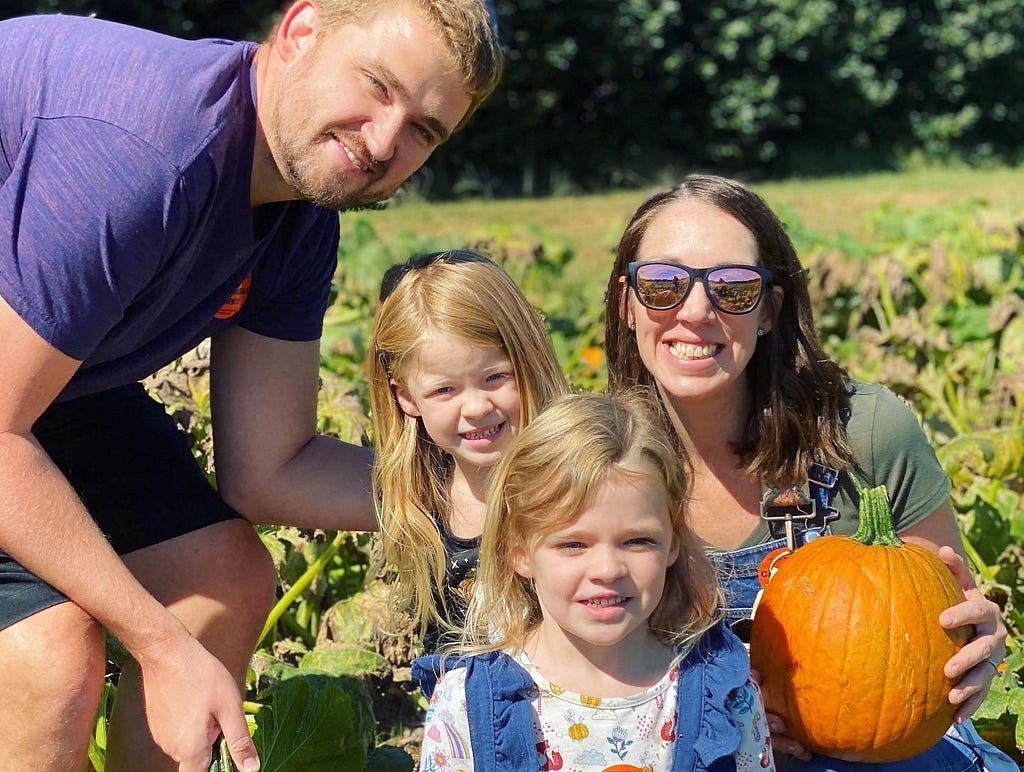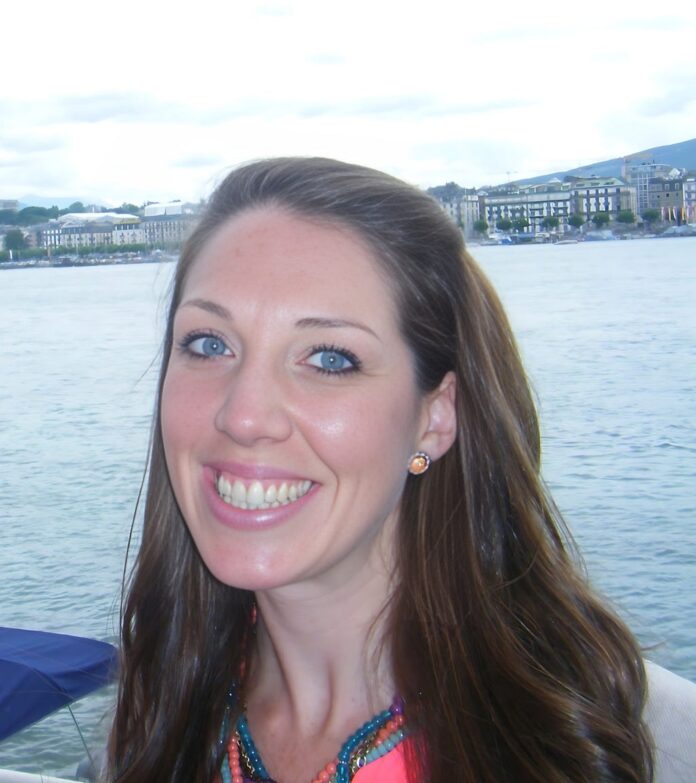An interview with Kelly Reeves
Stroke can affect anyone of any age, at any time. It is a common misconception that a stroke can only happen to older people, but I am proof that this is not the case. In fact, one out of five people who have a stroke are under age 55. Even if you are a healthy person and take good care of yourself it can still happen to you, so be aware of the signs and symptoms.
As a part of our “Unstoppable” series, we had the pleasure of interviewing Meghan.
Meghan McKee is a physical therapist of 14 years, living in North Carolina with her husband Steven and twin daughters. Meghan and her husband enjoy staying active, living a healthy lifestyle, and have participated in marathons and triathlons. Meghan was only 31 years old when she experienced a stroke and is now passionate about educating others to learn the BE FAST signs and symptoms of stroke and emphasizing the importance of calling 911 immediately.
Thank you so much for doing this with us! It is really an honor. Our readers would love to get to know you a bit better. Can you share your “backstory” with us?
I was aware that I had a heart condition called patent foramen ovale (PFO), which is a hole between the left and right upper chambers of the heart. Doctors always told me that stroke was a risk factor, but I should be okay if I stay active and healthy. I remember a doctor once saying, “if it ain’t broke, then don’t fix it.” When I was 27 years old, I read an article in a fitness magazine which made me more aware of the risk. It was about a young woman that was only two years older than me at the time and also happened to be a physical therapist. She spoke about her symptoms of stroke that she suffered while participating in a yoga class and she also had a PFO, like me. After reading that article, I took the risk more seriously, but still never truly thought it would happen to me. When I moved in with my now husband, I informed him of the BE FAST signs and symptoms of stroke so he would know what to do in an emergency. Even though I was able to educate my husband on the signs and symptoms of stroke, I was unable to recognize the symptoms of stroke when they were happening to me.
Do you feel comfortable sharing with us the story surrounding how you became disabled or became ill?
Eight years ago, when I was 31, my husband and I — who was my boyfriend at the time — sat down to watch a movie. I reached for my glass of water, and my arm felt weak, and I could not pick it up; thinking nothing of it, I grabbed the water with my other hand. After taking a sip, I started to choke. I then stood up and had trouble walking due to my left side being paralyzed, and I also didn’t realize my face started to droop. Although I didn’t immediately recognize the signs and symptoms of my stroke, my husband did and called 911 right away.
I spent four days in the hospital and underwent surgery to close the hole in my heart. I received speech, occupational and physical therapy. Thanks to my husband recognizing the symptoms and calling 911 immediately, I was able to make a full recovery. To this day, I have strength impairments in my hand and my foot, and my smile still is not fully symmetrical due to the stroke, but I am very lucky. There is not a day that goes by that I do not think about my impairments or weaknesses, but there is also not a day that goes by that I am not humbled to still literally walk this planet and live my life like I want.
What mental shift did you make to not let that “stop you”?
Experiencing a stroke at such a young age was scary, so once I recovered, I was determined to live life to the fullest and not take anything for granted. I went on to participate in several half marathons and continue to participate in yoga, strength training and running/cycling. Steven and I got married, have traveled the world and we became parents to beautiful twin girls. I can keep up with two very active 4-year-olds thanks to my husband recognizing the signs and symptoms of stroke, which allowed me to get medical attention fast!
Can you tell our readers about the accomplishments you have been able to make despite your disability or illness?
Some of my greatest accomplishments include marrying my husband, who was there with me that day, and having my beautiful twin daughters. I returned to work within two weeks of my stroke and have since become the Manager of Rehabilitation Services for several outpatient clinics in the Charlotte area. These clinics treat patients post-stroke and I feel that I am able to use my experience to connect with patients on an even more personal level. I have been able to share my struggles and fears in addition to my successes, which has helped provide hope and inclusion to this population. I have also been able to use my experience to raise awareness of stroke and educate others around the country about common signs and symptoms, risk factors and the importance of acting quickly. My hope is that by sharing my story, in addition to raising general awareness, I may be able to provide inspiration and hope to other stroke survivors and their families. Stroke changed my life, but it didn’t define it. I want to show that life goes on after a stroke, and it can be just as fulfilling and meaningful.
What advice would you give to other people who have disabilities or limitations?
Your illness, disability or limitations do not define you. Although I do have some lasting deficits due to my stroke, I don’t dwell on them and instead I am thankful that I had the opportunity to recover and be where I am today. There are a lot of rehabilitation resources out there to assist a person through their recovery and I encourage everyone to inquire with their physician how they may benefit from physical, occupational and/or speech therapy.
None of us are able to achieve success without some help along the way. Is there a particular person who you are grateful towards who helped get you to where you are?
The most influential person has been my husband, Steven. Without his strength and compassion, I would not have recovered like I did. Additionally, my mother, father, sister Melissa, and brothers, Keith and Kevin, have all been there for me and have encouraged me to get back to what I want to do. I am very fortunate to have a wonderful support system in my family.
How have you used your success to bring goodness to the world?
I think that my efforts to raise awareness and emphasize that a stroke can happen to anyone regardless of age are helpful. Educating others on the signs and symptoms of stroke and the importance of calling 911 immediately was the reason I made a full recovery and can help others better react in case of an emergency. I hope that through my efforts more people know what to do if they or someone they know is having a stroke, and it can ultimately save a life. Additionally, I have had the opportunity to speak at young stroke survivor support groups to provide insight into the rehabilitation profession and how to access resources to help patients early in their recovery.

Can you share “5 things I wish people understood or knew about people with physical limitations” and why.
1. When it comes to stroke, acting fast is the key to limiting potential disabilities such as problems with thinking, awareness, attention, learning, judgment and memory. This is why calling 911 immediately at symptom onset is critical.
2. Stroke symptoms can often be subtle and hard to recognize, therefore being aware of all possible signs and symptoms is important. The easiest way to remember these are with the acronym BE FAST, which stands for Balance, Eyes, Face, Arm, Speech and Time. If you or someone around you is experiencing irregularities in any of these things, call 911 immediately. For more information, please visit www.strokeawareness.com.
3. Stroke can affect anyone of any age, at any time. It is a common misconception that a stroke can only happen to older people, but I am proof that this is not the case. In fact, one out of five people who have a stroke are under age 55. Even if you are a healthy person and take good care of yourself it can still happen to you, so be aware of the signs and symptoms.
4. It is important not to ask a person what happened to them or what is wrong with them if they have physical limitations. I have remaining effects from experiencing a stroke, and although they are minimal, they are still there. I am proud to share my story as a hope to help someone, but recognize others may not feel the same way.
5. By knowing the BE FAST signs and symptoms of stroke, you can be the reason someone receives medical attention in a timely manner. Never wait to call 911, if you notice one or more of these symptoms, call 911 immediately.
Can you please give us your favorite “Life Lesson Quote”?
“The love in your heart isn’t put there to stay. Love isn’t love ‘till you give it away.”
“Avoid pessimism and embrace optimism.”
We are very blessed that some of the biggest names in Business, VC funding, Sports, and Entertainment read this column. Is there a person in the world, or in the US whom you would love to have a private breakfast or lunch with, and why? He or she might just see this 🙂
P!nk!! She is the person she wants to be and is unapologetic in the best possible way. She shows that you can be successful and can do it with your family by your side. P!nk in concert creates an experience for the audience that is hopeful, fun and exciting. She puts on the best show I have ever seen!
Thank you so much for the time you spent with this interview. We wish you continued success and good health!
Unstoppable: How Meghan McKee Has Redefined Success While Navigating Society After A Severe Stroke was originally published in Authority Magazine on Medium, where people are continuing the conversation by highlighting and responding to this story.


